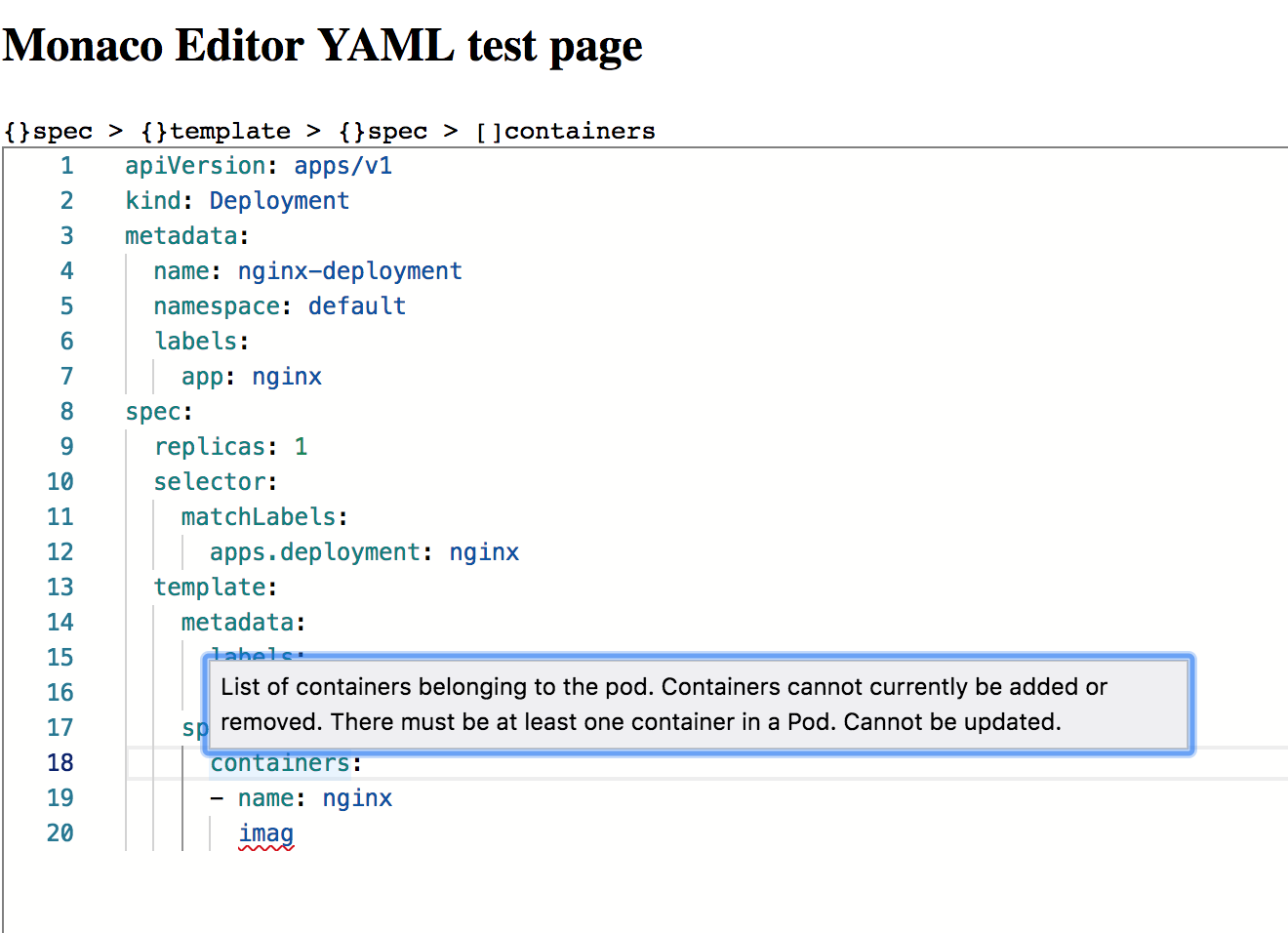YAML language plugin for the Monaco Editor. It provides the following features when editing YAML files:
- Code completion, based on JSON schemas or by looking at similar objects in the same file
- Hovers, based on JSON schemas
- Validation: Syntax errors and schema validation
- Formatting using Prettier
- Document Symbols
- Automatically load remote schema files (by enabling DiagnosticsOptions.enableSchemaRequest)
- Links from JSON references.
- Links and hover effects from YAML anchors.
Schemas can also be provided by configuration. See here for the API that the plugin offers to configure the YAML language support.
npm install monaco-yamlImport monaco-yaml and configure it before an editor instance is created.
import { editor, Uri } from 'monaco-editor';
import { setDiagnosticsOptions } from 'monaco-yaml';
// The uri is used for the schema file match.
const modelUri = Uri.parse('a:https://b/foo.yaml');
setDiagnosticsOptions({
enableSchemaRequest: true,
hover: true,
completion: true,
validate: true,
format: true,
schemas: [
{
// Id of the first schema
uri: 'https://myserver/foo-schema.json',
// Associate with our model
fileMatch: [String(modelUri)],
schema: {
type: 'object',
properties: {
p1: {
enum: ['v1', 'v2'],
},
p2: {
// Reference the second schema
$ref: 'https://myserver/bar-schema.json',
},
},
},
},
{
// Id of the first schema
uri: 'https://myserver/bar-schema.json',
schema: {
type: 'object',
properties: {
q1: {
enum: ['x1', 'x2'],
},
},
},
},
],
});
editor.create(document.createElement('editor'), {
// Monaco-yaml features should just work if the editor language is set to 'yaml'.
language: 'yaml',
model: editor.createModel('p1: \n', 'yaml', modelUri),
});Also make sure to register the web worker. When using Webpack 5, this looks like the code below. Other bundlers may use a different syntax, but the idea is the same. Languages you don’t used can be omitted.
window.MonacoEnvironment = {
getWorker(moduleId, label) {
switch (label) {
case 'editorWorkerService':
return new Worker(new URL('monaco-editor/esm/vs/editor/editor.worker', import.meta.url));
case 'css':
case 'less':
case 'scss':
return new Worker(new URL('monaco-editor/esm/vs/language/css/css.worker', import.meta.url));
case 'handlebars':
case 'html':
case 'razor':
return new Worker(
new URL('monaco-editor/esm/vs/language/html/html.worker', import.meta.url),
);
case 'json':
return new Worker(
new URL('monaco-editor/esm/vs/language/json/json.worker', import.meta.url),
);
case 'javascript':
case 'typescript':
return new Worker(
new URL('monaco-editor/esm/vs/language/typescript/ts.worker', import.meta.url),
);
case 'yaml':
return new Worker(new URL('monaco-yaml/yaml.worker', import.meta.url));
default:
throw new Error(`Unknown label ${label}`);
}
},
};A demo is available on monaco-yaml.js.org.
Some usage examples can be found in the examples directory.
No. Only ESM is supported.
No, because these use a UMD bundle, which isn’t supported.
No. These packages pull in the Monaco UMD bundle from a CDN. Because UMD isn’t supported, neither are these packages.
Yes. The web worker provides the core functionality of monaco-yaml.
No. monaco-yaml uses dependencies from node_modules, so they can be deduped and your bundle size
is decreased. This comes at the cost of not being able to use it without a bundler.
monaco-yaml only uses the Monaco Editor. It’s not tied to a framework, all that’s needed is a DOM
node to attach the Monaco Editor to. See the
Monaco Editor examples
for examples on how to integrate Monaco Editor in your project, then configure monaco-yaml as
described above.
Yes, but you’ll have to eject. See #92 (comment) for details.
Some users have experienced the following error when using Vite:
Uncaught (in promise) Error: Unexpected usage
at EditorSimpleWorker.loadForeignModule (editorSimpleWorker.js)
at webWorker.js
As a workaround, create a file named yaml.worker.js in your own project with the following
contents:
import 'monaco-yaml/yaml.worker.js';Then in your Monaco environment getWorker function, reference this file instead of referencing
monaco-yaml/yaml.worker.js directly:
import YamlWorker from './yaml.worker.js?worker';
window.MonacoEnvironment = {
getWorker(moduleId, label) {
switch (label) {
// Handle other cases
case 'yaml':
return new YamlWorker();
default:
throw new Error(`Unknown label ${label}`);
}
},
};This is most likely due to the fact that monaco-yaml is using a different instance of the
monaco-editor package than you are. This is something you’ll want to avoid regardless of
monaco-editor, because it means your bundle is significantly larger than it needs to be. This is
likely caused by one of the following issues:
-
A code splitting misconfiguration
To solve this, try inspecting your bundle using for example webpack-bundle-analyzer. If
monaco-editoris in there twice, this is the issue. It’s up to you to solve this, as it’s project-specific. -
You’re using a package which imports
monaco-editorfor you, but it’s using a different version.You can find out why the
monaco-editoris installed usingnpm ls monaco-editororyarn why monaco-editor. It should exist only once, but it’s ok if it’s deduped.You may be able to solve this by deleting your
node_modulesfolder andpackage-lock.jsonoryarn.lock, then runningnpm installoryarn installrespectively.
If you're using
monaco webpack plugin, then
instead of the above code, you can extend the plugin's configuration. Extend your
webpack.config.js file with the following:
import { MonacoWebpackPlugin } from 'monaco-editor-webpack-plugin';
export default {
// ...the rest of your webpack configuration...
plugins: [
new MonacoWebpackPlugin({
languages: ['yaml'],
customLanguages: [
{
label: 'yaml',
entry: 'monaco-yaml',
worker: {
id: 'monaco-yaml/yamlWorker',
entry: 'monaco-yaml/yaml.worker',
},
},
],
}),
],
};You can also refer to the example of a complete project.
You may have provided a schema configured like this:
{
uri: "https://example.com",
fileMatch: ["file_name.yml"],
schema: {
$schema: "https://json-schema.org/draft-07/schema#",
$id: "https://example.com",
title: "placeholder title",
description: "placeholder description",
type: "object",
properties: {
name: {
description: "name property description",
type: "string",
},
},
required: ["name"],
},
}And would be surprised to see the error:
Unable to load schema from 'https://example.com': Failed to fetch.
It happens because plugin uses schema URI not only as the URL to download the schema from, but also
to determine the schema name. To fix this, change the uri parameter to
https://example.com/schema-name.json.
Please see our contributing guidelines
Originally @kpdecker forked this repository from
monaco-json by
@microsoft and rewrote it to work with
yaml-language-server instead. Later
the repository maintenance was taken over by @pengx17. Eventually the
repository was tranferred to the account of @remcohaszing, who is
currently maintaining this repository with the help of @fleon and
@yazaabed.
The heavy processing is done in
yaml-language-server, best known for
being the backbone for vscode-yaml. This
repository provides a thin layer to add functionality provided by yaml-language-server into
monaco-editor.
